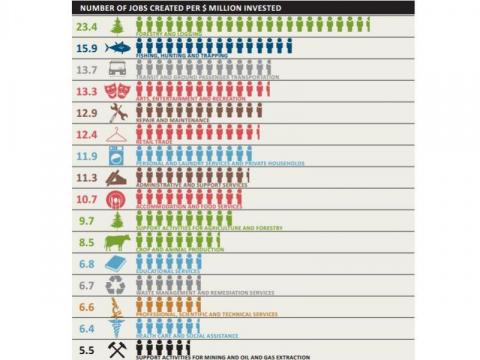
By Jack Bourassa, PSAC North Regional Executive Vice President
As published in the Yellowknifer, June 2015
 There’s no doubt the Government of the Northwest Territories is in an unenviable position. The price of oil is sinking like an anchor in rough seas, and commodity prices – in other words, diamonds, our territory’s bread and butter – are tumbling as well. With revenues taking such a hit, there’s no doubt something has to give.
There’s no doubt the Government of the Northwest Territories is in an unenviable position. The price of oil is sinking like an anchor in rough seas, and commodity prices – in other words, diamonds, our territory’s bread and butter – are tumbling as well. With revenues taking such a hit, there’s no doubt something has to give.
Former Finance Minister Michael Miltenberger harped continually about exercising “fiscal restraint” and pulling ourselves away from the “fiscal cliff” during the last Legislature, and seemed to imply the only way to achieve this was through systemic cuts to jobs and public services across the government.
The mood has very much been about doom and gloom, highlighting the end of an era of prosperity. In his own words, Premier Robert McLeod sounded the death knell himself. “The oil and gas industry has packed up and left the NWT. We don’t expect to any exploration for probably 10 years,” he said during an election survey.
So there’s no doubt the GNWT needs to get innovative in the way it deals with its rapidly emptying piggy bank.
That’s why it was so refreshing to hear the no-nonsense tax reforms presented to MLAs earlier this month.
The group PolicyLink proposed to bring in as much as $250 million in extra revenue simply by increasing taxes incrementally in several key areas, including tobacco products, alcohol and fuel and corporate taxes.
Now, before everyone gets their heckles up, let’s take a look at some of these minor changes – most of which will only be targeting the wealthy and corporations, but sparing the lowest income earners.
- A corporate income tax increase of just 1% would raise $8 million per year. Let’s keep in mind that other progressive Canadian governments are considering 10-12% increases.
- Imposing a resource income tax could raise as much as $34 million per diamond mine, money that is even now otherwise flooding out of the territory with little gain for its residents.
- An HST system, which nearly all of our southern neighbours already face, could generate $59 million per year, and a strong tax system could provide credits for lower income residents to help address the cost of living.
- Taxes on tobacco and liquor can generate an additional $5 million, which can be re-invested in treatment and addiction programs.
The benefit of increasing taxation is that everyone picks up a bit of the tab to increase government revenues, instead of leaving a small segment of residents to carry the bag through job losses and austerity measures.
In nearly every case, it’s working class residents who take on the greatest burden of austerity.
We can see the benefits of higher taxation in countries like Sweden, which has some of the highest taxation rates in the world, but its residents also enjoy the highest quality of living. The same cannot be said for Greece, which has resorted to drastic austerity measures, but has seen its labour force thrown into chaos.
Taxation is a sensible and sustainable way to increase the GNWT’s revenues without cuts to public services. There’s ample evidence that shows when public services are slashed, residents’ quality of life decreases and high-risk clients slip through the social security net.
When workers are trying to make the tough decision to make the Northwest Territories their home, they’re looking for reliable employment and a promising future, not the threat of job cuts and austerity measures.
If the GNWT wants to promote the territory as a place to call home, we need to get creative to increase our revenues and show we have a strong, robust labour force.
